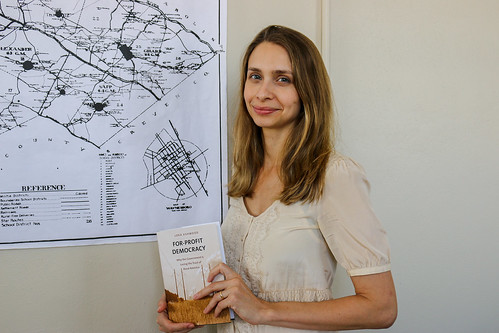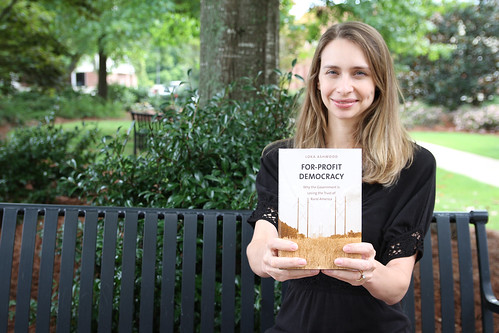Auburn College of Agriculture author chronicles rural distrust of government in new book
Article body
What began as a dissertation proposal exploring how rural people deal with the risk of living near nuclear reactors evolved over time into a compelling story that is being compared to a recent New York Times best-seller.
“I understood, as I met the people, that it was going to become more character-driven,” Loka Ashwood says of her recently published book, For-Profit Democracy: Why the Government Is Losing the Trust of Rural America. “Their words were so powerful, and the ways in which they spoke. I wanted to elevate that to a larger scale.”
The people she refers to are the residents of Burke County, Georgia, one of the poorest counties in the nation and home to Vogtle Power Plant, host of the first new nuclear reactors built in the U.S. in decades.
Ashwood, who is an assistant professor in the Auburn University College of Agriculture’s Department of Agricultural Economics and Rural Sociology, lived among and befriended some of the people of rural Burke County for four years while conducting research for the book that Publishers Weekly has compared to The New York Times No. 1 best-seller Hillbilly Elegy by J.D. Vance.
Published by Yale University Press and released on June 26, Ashwood’s 328-page book offers a sociological assessment of the damaging effects of the for‑profit partnership between government and corporations on rural Americans.
Drawing on her background as a journalist, she uses the personal stories of the people of Burke County—gleaned from 89 interviews—to intertwine current hot-button issues such as racial discrimination, religion, gun rights and economic inequality with an exhaustive study on how for-profit democracy shapes power and politics in rural America.
Ashwood was captivated by the Burke County site because it was the only location at the time where ground was being broken on new nuclear reactor construction.
“I initially set out to discover whether or not the local people liked having a nuclear power plant as a neighbor,” she said. “But the first thing that impacted me was that everyone wanted to talk about how their land was being taken from them. Perhaps it sounds very naïve in retrospect, but I never considered that eminent domain or the threat of it would be used to take their property, at least not to the extent that it was happening to these people.”
In her search to find out how citizens’ land could be forcibly taken, Ashwood discovered the growing for-profit orientations of democracy.
“Like many Americans, I thought there was no way your land could be taken in such a way, so I wanted to learn how a for-profit company could claim land that initially belonged to a private property owner,” she said. “That’s where I started this deeper search, delving into the history of corporations and land takings and the history of property ownership in the South, in Burke County and in Georgia. That’s what led to this idea of ‘for-profit democracy.’”
Ashwood’s definition of for-profit democracy is two-fold.
“It goes back to the state, and when it decides what is best for the people based on what makes the most money for the most people who rule,” she said. “That’s damaging to people in two ways. If you say that the purpose of democracy is to serve the most people, then anyone in a minority is vulnerable, and rural people are constantly in a minority.”
Also, U.S. Supreme Court rulings are continuously building up the rights of for-profit corporations, she said.
“This goes back centuries in the United States,” Ashwood said. “It means that if you make more revenue, and you offer more tax dollars, you are going to hold the greatest and the most rights, regardless of other costs.”
She also explains it as the “rule of numbers”—the most money or the most people.
“I find that it has very damaging consequences for people’s faith in the government, especially rural people because they get hit in both directions,” she said. “Even if you have more money and are in a rural area, people’s rights are more susceptible. While they are not necessarily a racial minority, they are a rural minority.”
Ashwood grew up on a family farm in Illinois, which gave her credibility to the people in rural east Georgia, along with an innate empathy for those fighting to save their land.
“I understand the multigenerational attachment,” she said. “But some in Burke County saw neighboring farmers as aristocrats, so to speak, who were benefitting from government subsidies. I had to look into the mirror before I questioned some of my subjects—they helped to push me.”
Ashwood’s rural background also helped in gaining the trust of people in the black community.
“They understood that I at least knew what they were talking about, and that I knew the meaning of the land,” she said. “I knew their history, and I wasn’t afraid to go out into certain areas. They trusted that I wouldn’t be disgusted or judgmental about the level of poverty I was witnessing. In most rural areas, people have less money and fewer services, so I was accustomed to that.”
Burke County is classified as a “persistent poverty” county, with more than 20 percent of the people living in poverty for more than three decades. Some of the people interviewed by Ashwood were living in trailers without electricity or running water.
“My No. 1 motivation for writing this book was to help the people of Burke County,” she said. “I had hoped that maybe I could bridge the divide and help people talk with one another.
“Maybe if they all could come together and demand that the government stop taking their land, then it could collapse some of the racial issues we now have in this country of white versus black. If people could discover their shared issues, maybe they could put a stop to the seizing of their land.”
A second motivation for the book, Ashwood said, was to try and discover why rural people are getting poorer, more disenfranchised and more against the government on a national scale.
“We don’t hear this being discussed much in the popular media or even in conversation,” she said. “We hear a lot of generalizations about rural people being uneducated or being politically radical. I wanted to help people understand the broader processes that could help make anyone become vulnerable, or make anyone the next minority.
“What’s happening in rural America also could occur and already is occurring in urban places. We can use these broader concepts to make change and inspire change, and that’s why I tried to write it accessibly.”
Her biggest challenge in writing the book was showing respect to all the people of Burke while being honest with the reader, Ashwood said.
“Selecting certain quotes to be included proved to be very difficult,” she said. “There are racially charged quotes in the book, but they are quotes of what people actually said. I knew some of the families who read it would not be happy, and one family wasn’t. It’s especially difficult because I grew to like these people and built relationships with them.
“As a journalist, your job is not to be the morally corrective force but to report what is said.”
Ashwood feels the relevance of the book’s subject matter has only grown since she began working on it.
“Rural politics matter,” she said. “Some of the issues I address in the book are more controversial now than ever before. The chapter on racial animosity is a realistic message that is more relevant than ever, and we can actually make change if we reduce corporate power and elevate individual human rights. We could do that right now and help regain trust in the American government.”
Ashwood will be speaking about her book at the Auburn University Discover Auburn Lecture Series on Sept. 20 at 3 p.m. This yearlong series features programs on Auburn University research, history and other topics of interest. The series is co-sponsored by the Auburn University Libraries, the Caroline Marshall Draughon Center for the Arts & Humanities and the Auburn University Bookstore. Lectures are held in the Special Collections Department of the Ralph Brown Draughon Library.
She also will join such authors as Pulitzer Prize winner Rick Bragg and Associate Justice of the U.S. Supreme Court Sonia Sotomayor at the 30th Annual Southern Festival of Books to be held Oct. 12-14 at the War Memorial Plaza and the Nashville Public Library downtown.
The book is available from Amazon and other booksellers.
Related Media
Media interested in this story can contact Communications Director Preston Sparks at (334) 844-9999 or preston.sparks@auburn.edu.
Auburn University is a nationally ranked land grant institution recognized for its commitment to world-class scholarship, interdisciplinary research with an elite, top-tier Carnegie R1 classification, life-changing outreach with Carnegie’s Community Engagement designation and an undergraduate education experience second to none. Auburn is home to more than 30,000 students, and its faculty and research partners collaborate to develop and deliver meaningful scholarship, science and technology-based advancements that meet pressing regional, national and global needs. Auburn’s commitment to active student engagement, professional success and public/private partnership drives a growing reputation for outreach and extension that delivers broad economic, health and societal impact.






